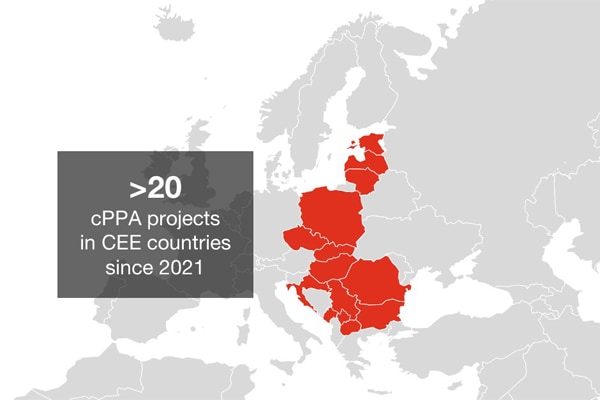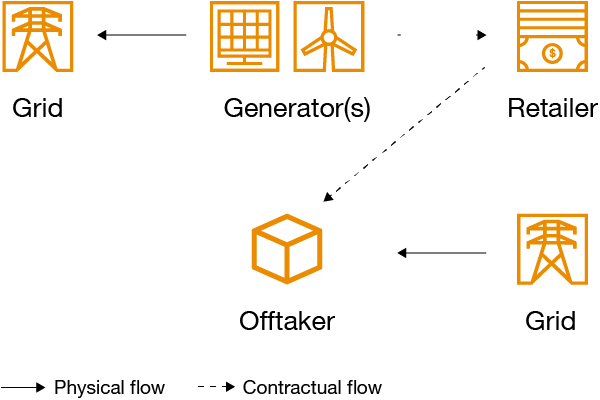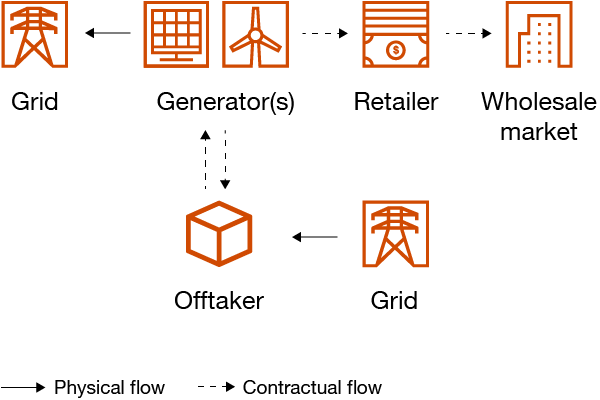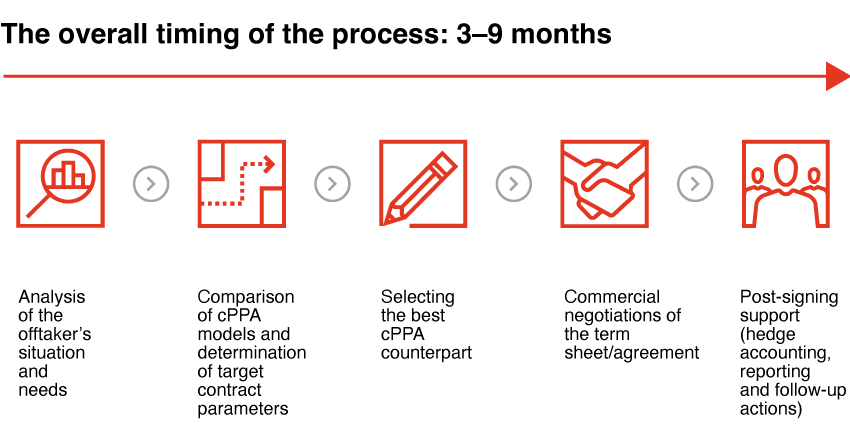Development of strategic options for contracting renewable electricity and cPPA implementation support for a corporate off-taker in telecom industry in Croatia
Client #1
Read more >
Based on experience gained through conducting numerous cPPA processes on the multinational markets we provide services to address all the needs of energy consumers — from obtaining offers from the market, evaluating them and assessing the actual costs and profitability of the contract through negotiation and implementation.
We work as a part of the PwC network composed of CEE countries. Since 2021, we have finished more than 20 cPPA projects for our clients.
Corporate Power Purchase Agreements (cPPAs) are long-term contracts for the purchase of electricity from renewable energy sources (RES), i.e. photovoltaic and wind farms, concluded directly between energy producers and corporate consumers. The location of the energy source is also not a limitation, as agreements can be in-border or cross-border.
Generators are interested in cPPAs because these contracts can be considered for most of their renewable energy products.
Physical contracts, which include physical delivery of electricity between the parties
Virtual contracts, which are bilateral financial instruments aimed at hedging the price of electricity for both parties (similar to traditional commodity swap/contract for difference)
Pay-as-produced
Pay-as-nominated
Guaranteed curve
Baseload
Electricity offered through cPPAs is usually cheaper than electricity offered by retailers and traded at energy exchanges. The differences can reach up to several tens of per cent.
cPPAs are the only realistic option to fix the costs of energy purchases in the long term (more than five years). Higher predictability of costs positively impacts companies regardless of their scale and industry.
cPPAs are globally approved measures for the realization of green energy targets. Moreover, this type of contract is prioritised in the European regulations and widely used by global players in almost all energy-consuming (and not only) industries.
How to properly address the uncertainty and volatility risks associated with renewable energy production?
How to prepare for a demanding negotiation process with an energy producer?
What tax, legal and accounting aspects should be considered early in the negotiation process?
While the savings from the cPPA are important from a business perspective, they are the backdrop to the entire contract, which is primarily aimed at hedging the risk of electricity prices and supplies. The main value for the recipient is the defined effective price of electricity covered by the contract during its term.
cPPAs, despite their huge potential related to green energy and possible savings, aren’t the easiest contracts to tackle from the accounting perspective. This relates especially to virtual cPPAs, which are financial instruments, and as such, they need to be presented at fair value on each reporting date.
Therefore, despite the many benefits of cPPAs, it is important to recognise the complexity of the process and the challenges involved. Contracts require proper goal setting and preparation for the negotiation process. When those risks aren’t properly addressed in a contract, they may result in financial loss and — in the long term — the loss of control over electricity costs.
We provide clients with full support to address all needs related to energy consumption — from analysing the cPPA potential of the company through the go-to-market process, obtaining offers from the bidders, analysing profitability and assessing risk to supporting in the negotiation process, ending with signing the cPPA with producers.
At PwC, we have CEE cPPA Hub - an initiative that connects PwC teams from Bulgaria, Estonia, Czech Republic, Hungary, Latvia, Poland, Romania, Slovakia, Croatia & other Southern Europe territories, which are involved in cPPA project.
We conduct numerous substantive workshops with the client, which give the basis for effective decision-making within the project. During the workshops, we aim to enhance client understanding of the business, accounting, tax and legal implications of signing the PPA. This model of cooperation helps increase client awareness of the genesis of the contract, project timeline as well as outlines the path of actions on the client's side that should be taken in order to sign a favourable agreement.
Read more >
Read more >
Read more >
Read more >
Read more >
Read more >
Read more >
Read more >
cPPA
Corporate power purchase agreement — a contract between the generator of electricity and the offtaker (without direct intermediation of a retailer apart from sleeving/BRP services)
Sleever / BRP
Sleever or BRP (Balancing responsible party), depending on the jurisdiction its obligations, are equivalent to sleeving service (intermediation between generation source and the offtaker in case of physical power purchase agreement).
In-border cPPA
A contract between offtakers and generators located in the same country.
Cross-border (XB) cPPA
This solution is utilised in the event of the imbalance between the demand and supply of renewable energy by offtakers and RES assets, respectively. Such a situation may occur, e.g. in case there is insufficient demand for cPPAs in a given country, and thus, the generator may seek contracting energy with the offtaker located abroad. Considering multiple challenges facing physical agreements (securing cross-border transmission rights), XB cPPAs are contracted in a virtual/financial model. However, this is related to several regulatory, tax and commercial risks (i.a., basis and currency risks) that have to be considered and, if possible, mitigated within the sourcing process.
Types of RES plants



